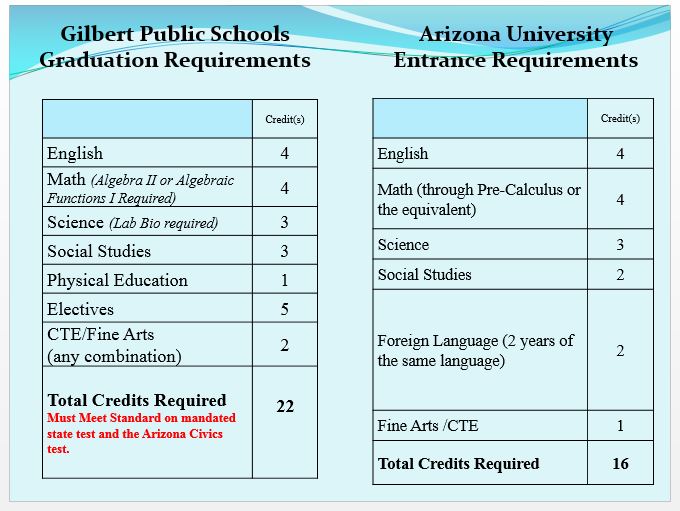HIGH SCHOOL CLASSES COLLEGES LOOK FORIf you’re in high school and you’re thinking about college — and you should be — you should know that the courses you take now matter. That’s because college admission officers want to see a solid foundation of learning that you can build on in college.
To create that foundation, take at least five solid academic classes every semester. Start with the basics, and then move on to challenging yourself in advanced courses. The courses listed below should prepare you for success in college and beyond.
|
Choosing the Right High School Classes |
English (Language Arts)
Take English every year. Traditional courses, such as American and English literature, help improve your writing skills, reading comprehension and vocabulary.
Take English every year. Traditional courses, such as American and English literature, help improve your writing skills, reading comprehension and vocabulary.
|
Math
Algebra and geometry help you succeed on college entrance exams and in college math classes. Take them early, so you'll have time for advanced science and math, which will help show colleges you're ready for higher-level work. Most colleges want students with four years of high school math. The more competitive colleges prefer advanced math courses. Take some combination of the following:
Social Studies Improve your understanding of local and world events by studying the cultures and history that helped shape them. Here is a suggested high school course plan:
|
Science
Science teaches you how to think analytically and how to apply theories to reality. Colleges want to see that you’ve taken at least three years of laboratory science classes. A good combination includes a year of each of the following:
Foreign Languages
Solid foreign language study shows that you're willing to stretch beyond the basics. Many colleges require at least two years of study in the same foreign language, and some prefer more. The Arts Research indicates that students who participate in the arts often do better in school and on standardized tests. The arts help you recognize patterns, learn to notice differences and similarities, and exercise your mind in unique ways. Many colleges require or recommend one or two semesters in the arts. Good choices include studio art, dance, music and drama. |
Challenging Course Work
To ready yourself for college-level work, enroll in challenging high school courses, such as honors classes, AP courses or IB-program courses. You may even be able to take college courses at your high school or a local college.
More Help with Choosing Courses
Use College Search to look up a specific college's academic requirements to be sure you’re on track to attend the college of your choice. You can also meet with a school counselor or teacher if you have questions about choosing classes and staying on track for college.
To ready yourself for college-level work, enroll in challenging high school courses, such as honors classes, AP courses or IB-program courses. You may even be able to take college courses at your high school or a local college.
More Help with Choosing Courses
Use College Search to look up a specific college's academic requirements to be sure you’re on track to attend the college of your choice. You can also meet with a school counselor or teacher if you have questions about choosing classes and staying on track for college.
High school vocabulary to know
|
Academic Progress
|
Shows where you are in having the appropriate amount of credits toward graduation.
|
|
Course Load
|
Number of courses, classes, or credits you take each semester or school year.
|
|
Credit
|
Primary method used to determine and document that students have met academic requirements, generally at the high school level. Credits are awarded upon completing and passing a course or required school program.
|
|
Department
|
Division of school that is related to a subject area.
(For example, the Science Department.) |
|
Prerequisite
|
Course that you are required to take before taking a more advanced course. (For example, Algebra I is a prerequisite to Algebra II.)
|
|
Transcript
|
A record of your academic accomplishments in high school. It lists every class you took, when you took them, and the grade you received in each class, sometimes along with additional information such as standardized test scores and any honors you received.
|

